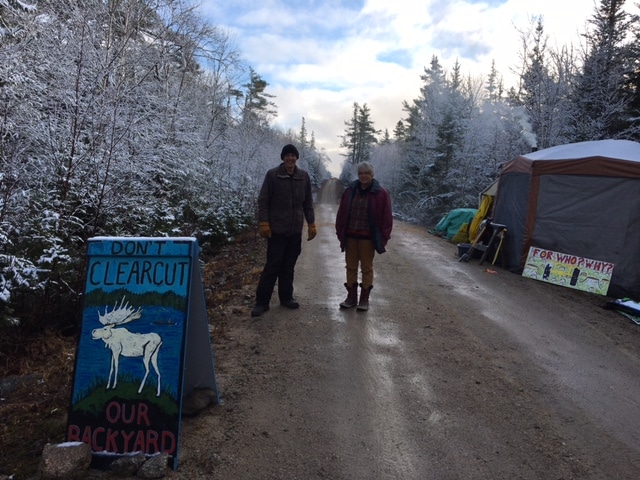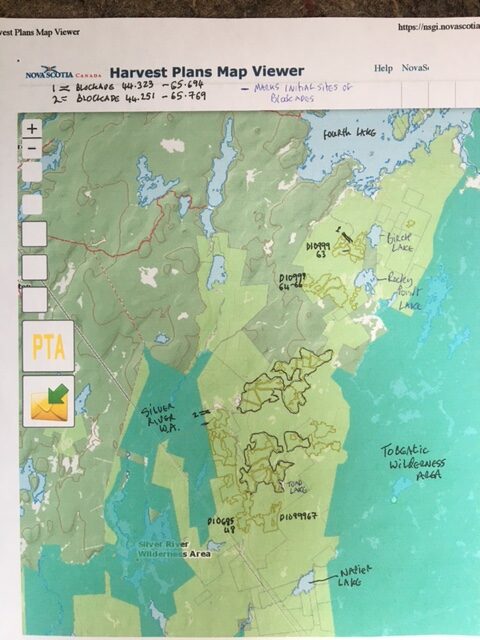
Background: I spent the day in the Nova Scotia Supreme Court on January 26th, observing WestFor’s application to extend the temporary injunction they were granted in December against the Extinction Rebellion Nova Scotia Association and John and Jane Doe. WestFor is a consortium of 13 sawmills.
Nine Moose Country forest protectors — including me — were arrested for failing to obey this injunction. The injunction barred anyone from blocking any logging road anywhere on crown land that WestFor has a license to harvest. We face criminal charges of disobeying a court order. Our cases will be heard on March 15th in Provincial Court in Digby. We are all forbidden, under the terms of the undertaking we signed when we were arrested, from setting foot on any of the crown lands covered by the injunction. Due to COVID regulations, I was the sole representative in the public gallery of the people who blockaded logging roads in Digby County for 8 weeks. I submitted an affidavit but WestFor’s lawyers chose not to cross-examine me.
I plan to write several notes covering different aspects of the hearing. This second one has to do with the Province’s Harvest Plan Map Viewer and the illusion of consent.
In his argument for extending their exceedingly broad injunction, WestFor’s lawyer, Ian Dunbar, painted a picture of the people who interfered with WestFor’s contractors’ harvesting activities as a bunch of blockade happy activists who had failed to make use of the proper channel to express their concerns, instead resorting to ‘self-help remedies.’ I have some sympathy for the idea that a company that has followed the rules laid out for it by the government should be able to go about its business. Companies, like citizens, function best in a predictable environment. So what is this proper channel we should have used?
Marcus Zwicker, WestFor’s general manager, outlined the process by which harvests are approved for crown land in Southwest Nova Scotia in his affidavit of December 7th, 2020:
Under the License agreement between WestFor and the Province, “the Province assesses and identifies areas across Nova Scotia that are suitable, available, and ready for Forestry Activities.
Once the Province has identified these areas, WestFor submits a plan outlining its proposed Forestry Activities plan for each area. The Province thereafter publishes WestFor’s proposed Forestry Activities for public comment.
If WestFor’s plan is approved, a permit is issued in WestFor’s name (“Permit”). Issuance of a Permit does not mean the Forestry Activities will take place immediately. The Permit is added to WestFor’s operations schedule.”

The place where the Province publishes WestFor’s proposed Forestry Activities is online on the Harvest Plan Map Viewer. https://nsgi.novascotia.ca/hpmv/ This is the site where, according to WestFor’s lawyer, we could legitimately have expressed our concern that WestFor’s contractors were about to clearcut important habitat in an area where endangered Mainland moose were present. We would have had forty days to make our comments.
Of course we would have to have made them back in November 2019 when the plans for cutting near Rockypoint Lake and Napier Lake were up for comment. In October 2020 what led us to focus on those harvest areas was a Facebook post by a local man with a photograph of a moose and her calf and the statement that clearcutting was starting in the area. This same man was able to show a CBC interviewer fresh moose tracks near Rockypoint Lake 5 days before we set up the first blockade. Back in November 2019 we did not have this information. So how could we have identified these sites? Did the Harvest Plan Map Viewer warn of the possible presence of endangered Mainland moose in the area? No. There is no mention of wildlife, endangered or not, on the HPMV. None.
In fact the HPMV gives you very little to go on when entering these all important comments – your one official chance, as a citizen, to have your say on the fate of forests on our public lands. It does, if you know your way around, allow you to see past proposed cuts in addition to the current ones you can comment on. Past meaning since 2016. But there is nothing to tell you if the cuts were approved, when they are due to be cut, or even if they have in fact been cut already.
If you sign up, as I have, to receive an email every ten days detailing the latest proposed cuts on all crown lands in Nova Scotia, you will receive a list, broken down by county, of proposed cuts with an ID name and number such as Rockypoint Lake DI099965 F; the area in hectares of the proposed cut; the prescription, eg Variable Retention 30%; how long you have to comment and the cut-off date for comments.
In 2019 you would have received 32 emails listing 654 proposed harvests totalling12,395 hectares. In 2020, another 32 emails listed 738 proposed harvests totalling 16,617 hectares.
Supposing you made it through the despair that grips many of us on seeing page after page of proposed clearcuts under all the bogus names the Department of Lands and Forestry uses to disguise the ongoing decimation of our forests, and supposing your internet connection was stable enough for you to make a comment on the plans for a particular parcel you plucked from the list, what would happen? Most of the time, in my experience and that of many others who have tried commenting, nothing. Mostly there is no reply, or else a boiler plate assurance that forestry is being committed to the highest standards. I know of only one person who, after hundreds of submissions, actually got a response suggesting a harvest plan would be changed as a result of her comment.
You would think that, since you were on a site set up by the Nova Scotia government, your comments would go to the Department of Lands and Forestry. This, after all, is your one opportunity as a citizen to raise any concerns you may have about WestFor’s harvest plans for our public land. It might come as a surprise, then, to learn that your comments are cc-ed, with your name and email address, to none other than Marcus Zwicker, general manager of WestFor.
How cosy is the relationship between DLF and this consortium of sawmills? Instead of a genuine opportunity for citizens to have a say in the way forests and wildlife are treated on public land, the HPMV seems designed to create the illusion of consent. Government and industry working hand in glove.
But wait, there have been other opportunities for citizens to comment on ‘Forestry Activities’ in Nova Scotia. The Natural Resources Strategy consultations engaged thousands of Nova Scotians. Those citizens overwhelmingly agreed, as they have every time they have been asked since, that they wanted to see a drastic reduction in clearcutting. Instead of acting on the results of these consultations, the current government has gone on pandering to industrial forestry. Pretty much every environmental group in the province is now calling for a moratorium on clearcutting on crown land until the latest report is implemented. How much more evidence does the government need that clearcutting forests has lost the most important license of all – social license?
The same can be said for the government’s failure to act on its legal obligation to protect endangered species.
Rather than blaming the blockaders for the inconvenience they have faced, WestFor might turn its glare on the government.
If, as Marcus Zwicker’s affidavit says, the starting point for this whole planning process is that “the Province assesses and identifies areas across Nova Scotia that are suitable, available, and ready for Forestry Activities,” then the Province is at fault for ever having identified the crown lands between the Tobeatic and the Silver River Wilderness areas as available for Forestry Activities. None of the lands in the ‘Moose Concentration Area’ map the Province put out in 2012 can be considered suitable until the DLF has fulfilled its legal obligation to identify core habitat for the endangered moose.
When a department is so broken it can’t meet its basic obligations, and when government and industry are so entwined that a mechanism supposed to give citizens a say is a sham, then what remains to those citizens who cannot and will not look away while a species is driven to extirpation in the interests of business as usual? Letters? Check. Phone calls? Check. Petitions? Check. Demonstrations? Check. There are times when civil disobedience is a considered act of conscience.
See also: Notes from Court: Extending the injunction against Extinction Rebellion Nova Scotia



